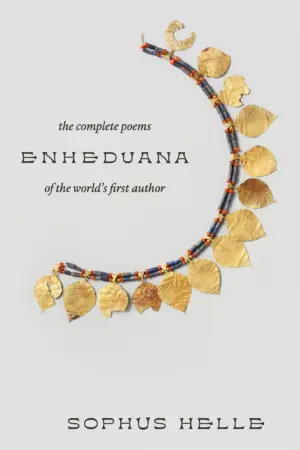Enheduana: The Complete Poems of the World’s First Author
by Sophus Helle
reviewed by Rhony Bhopla
In Enheduana: The Complete Poems of The World’s First Author, Sophus Helle provides Anglophone readers access to the Sumerian author Enheduana’s arresting poems, which embody bursts of momentum and delight. In the first long poem, “The Exaltation of Inana,” praise and desire are translated through lyrical beauty into words such as stone and storm, as well as wear, with, and wind.
My queen, your
strength can make
teeth crush stone.
You strike like the
roar of the storm.
Your howl is like
the Storm God’s
howl. You wear
yourself out with
wind after wind
but your feet stay
strong.
Enheduana was the high priestess of the Sumerian city-state Ur, known as modern-day Iraq. She held extreme power in the first known empire that was established by her father, Sargon of Akkad. The poems were written in Sumerian on clay tablets by her successors in the Old Babylonian schools in 2300 BCE, a century after the priestess is thought to have lived. The relief-like texts now hold significance for current-day sociopolitical issues.
The poems appear in four translated sections: “The Exaltation of Inana,” “The Hymn to Inana,” “The Temple Hymns,” and “Fragmentary Hymns.” Additionally, there are three essays by Helle that provide insight into his approach to translation, based on his work and that of other scholars, as well as discussion of themes like climate change, war, grief, and the subversion of normative gender roles in the poetry.
The book begins with the highly charged “The Exaltation of Inana,” in which short lines move in long stanzas with a devotional tone. Helle explains in his essay that Sumerian was unrelated to any other language and was phased out by the dominant Akkadian language. The language shift, which brings to mind today’s evolving and disappearing languages, was a response to economic viability and social expectations.
The first section is a song-like tribute to Inana—the goddess of Love, War, and Fertility—in which Enheduana likens the goddess to the forces of the natural world:
You are like
a flash flood that
gushes down the
mountainsRaging rainfall of
fire! It was An who
gave you power.
The translation has an erotic quality and recalls some of the world’s most renowned mystic poets such as Rumi, Hafiz, and Kabir. While the poems also praise violence, Helle suggests that “Enheduana’s depiction of war seems oddly impersonal”: “It is as if the machinery of murder is powered by its own innate will, a will to which humans are merely subjected … in Enheduana’s poems, war is unheroic.”
The ritual of lamentation, Helle explains, is central to Enheduana’s poems. The intimacy between author and goddess is heightened in this series of grandiose laments meant to appease Inana and demonstrate both ardor and internal transformation:
The pain filled
me, overwhelmed me.
Queen, lady! For you,
I have given birth to
it: what I sang to you
at dead of night, let
a lamenter repeat at
midday. For your
captive spouse and
your captive child,
your fury grows ever
greater, your heart
can find no rest.
The poems and essays together form an evolving picture of Sumerian society, attitudes toward women—and specifically women in leadership roles—as well as non-normative gender roles. In “The Hymn to Inana,” she “opens the doors / to the house of wisdom / reveals what lies / within.” Intellectual might and the spiritual realm are enmeshed in these descriptions of Inana by Enheduana. Additionally, gender subversion reflects the transformative power of the goddess:
She set a
great burden on their
body, blessed them,
and named them the
Pilipili. She snapped
a spear and gave it
to them, as if they
were men.
Enheduana was an exiled woman of sorts, part of a culture whose language was shouldered out of the mainstream. Helle quotes the Iraqi-American poet Dunya Mikhail who identifies with Enheduana as a “fellow exile” and relates to Enheduana’s duality: “As an immigrant, I myself have that duality of existence.” To be exiled from one’s own country, whether by choice or not, is a painful and at times violent separation, one that manifests in ways unforeseen. Enheduana herself describes a type of alienation in a visceral manner: “My Nanna does not / care for me, and so / I waste away in this / land of lies.”
Enheduana’s poems revel in the human experience and the emotional power of the human voice. This new translation is a treasure that opens up a world of possibilities, connecting a priestess of the past to women authors of the present and future.
Published on December 14, 2023

